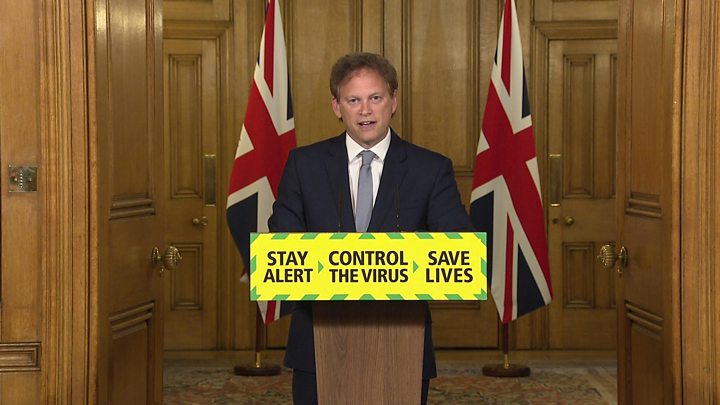Coronavirus: Face coverings to be mandatory on public transport

Wearing face coverings will be compulsory on public transport in England from 15 June, the transport secretary has said.
Grant Shapps said "every precaution" must be taken as passenger numbers are expected to increase when lockdown measures are further eased.
People will be have to wear coverings on buses, trains, aircraft and ferries.
Very young children, disabled people and those with breathing difficulties will be exempt, he said.
It comes as the UK recorded the deaths of another 176 people who tested positive for coronavirus, taking the total number of deaths in the UK to 39,904.
Speaking at the daily coronavirus briefing, Mr Shapps said face coverings would be "a condition of travel" and not wearing one could "ultimately" lead to a fine.
But he added: "Why wouldn't people want to do the right thing?"
Mr Shapps said surgical masks must be kept for clinical settings and instead travellers should wear the kind of face covering that can be made at home.
The change coincides with the planned reopening of non-essential retail and return of some secondary school pupils in England from 15 June, which Mr Shapps said would put "more pressure" on the public transport network.
Earlier, Scotland's First Minister Nicola Sturgeon said her government was considering whether to make it mandatory to wear face coverings in some situations.
Scotland currently recommends wearing coverings in shops and on public transport.
In Wales, face coverings have not yet been recommended for the general public. In Northern Ireland, people have been told to consider wearing them in places where they cannot observe social distancing.
'A significant change'
The government has for some time made tentative, nudging references to wearing face coverings in enclosed public spaces - but has long acknowledged the scientific case for wearing them isn't clear cut.
Take this from the prime minister at the end of April, when Boris Johnson said: "As part of coming out of the lockdown, I do think that face coverings will be useful both for epidemiological reasons but also for giving people confidence that they can go back to work."
But, until now, wearing them has been voluntary - and so today's announcement marks a significant change.
Wearing a face covering can prevent an infected person passing on the virus, rather than stopping someone contracting it.
BBC science editor David Shukman said research on face coverings has been described as "slim" by many authorities, and for health professionals there has always been the fear of a rush to snap up medical-grade masks.
But studies in laboratories have shown not only how far droplets can be spread by coughs but also how various kinds of materials can dramatically reduce many of those droplets that do get through, he added.
Network Rail chairman Sir Peter Hendy said he was not expecting a "huge surge" in staff policing these new rules.
"I am expecting sensible passengers to do their duty and look after themselves and others," he said at the Downing Street briefing.
Transport unions welcomed the announcement.
Mick Whelan, general secretary of the train drivers' union Aslef, said it was a "sensible step" which would help to ease concerns of travellers.
However, Mick Cash, general secretary of the RMT union, said it was "long overdue" and face coverings alone were "nowhere near enough" to protect passengers and workers.